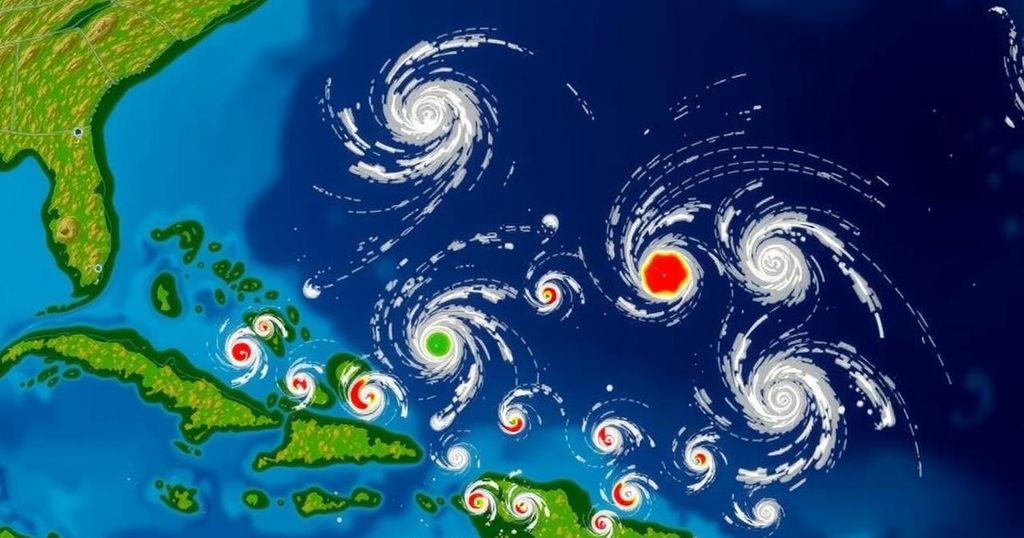2024 Hurricane Season Ends with Record Activity and Devastation

The 2024 Atlantic hurricane season concluded with 11 hurricanes, surpassing the average of seven. Noteworthy storms included Hurricane Beryl, the earliest Category 5 hurricane, and Hurricane Helene, the deadliest since Katrina, causing over 200 deaths. Climate factors contributed to an unprecedented season, highlighting the urgent need for awareness and readiness in the face of changing weather patterns.
The 2024 Atlantic hurricane season concluded on Saturday, marking an unprecedented year characterized by 11 hurricanes, significantly above the historical average of seven. This active season resulted in extensive destruction across the U.S. Gulf Coast, affecting regions far from where the storms made landfall. Meteorologists described this season as “crazy busy,” largely due to the unusually elevated ocean temperatures prevalent throughout the Atlantic.
Among the notable storms was Hurricane Beryl, which made history as the first Category 4 hurricane to develop in June, impacting Grenada and resulting in fatalities and extensive damage in Jamaica. Remarkably, Beryl intensified to become the earliest Category 5 hurricane in the Atlantic on July 1, showcasing a trend of major hurricanes forming earlier than the conventional September 1 onset.
In September, Hurricane Helene emerged as the deadliest storm since Hurricane Katrina, with over 200 casualties reported, primarily in North Carolina. The economic toll has been staggering, with estimates suggesting damages may exceed $48.8 billion due to the destruction of houses, agricultural resources, and infrastructure across several states, including Florida and South Carolina.
October saw Hurricane Milton, which rapidly intensified to deliver winds of up to 180 mph, ranking it among the strongest hurricanes recorded in the Gulf of Mexico. The ensuing months resulted in unprecedented rainfall for several areas, setting records in Asheville, Tampa, and Orlando during this critical hurricane period.
In November, Hurricane Rafael approached the strength of the strongest November hurricane in the Gulf, tying with Hurricane Kate from 1985, as it made landfall in Cuba amid ongoing recovery efforts from prior storms. Scientists suggest that climate change might be contributing to these anomalous storm patterns due to the increased warming of ocean waters, which influences hurricane behavior.
Brian McNoldy, a researcher at the University of Miami, observed, “In other words, we never had a storm as strong as Beryl so early in the season anywhere in the Atlantic and we never had a storm as strong as Milton so late in the season in the Gulf of Mexico.” Furthermore, he noted that while he refrains from attributing specific events solely to climate change, it undeniably increases the likelihood of extreme weather occurrences.
This hurricane season has raised concerns regarding future weather patterns, emphasizing the ongoing influence of climate change on the frequency and intensity of hurricanes in the Atlantic.
The 2024 hurricane season illustrated a remarkable increase in hurricane activity, generating widespread concern among meteorologists and scientists regarding the implications of climate change. Rather than following traditional patterns, this season’s storms exhibited anomalous behavior due to variances in sea temperature, resulting in stronger storms emerging earlier and later in the season than typically expected. Such occurrences underline the need for further investigation into the interplay between climate dynamics and hurricane formation.
In conclusion, the 2024 Atlantic hurricane season has been marked by an alarming increase in hurricane formations, with significant implications for climate-related research. With 11 hurricanes, including extraordinary events like Beryl and Milton, the devastation incurred across multiple states has spotlighted the societal and economic impacts of these storms. As conditions suggest an increasing volatility in hurricane behavior tied to climate change, the imperative for preparedness and research has never been greater.
Original Source: www.arkansasonline.com








